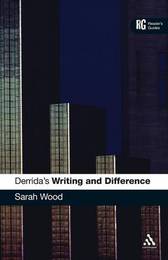
|
Derrida's 'Writing and Difference': A Reader's Guide
Paperback / softback
Main Details
| Title |
Derrida's 'Writing and Difference': A Reader's Guide
|
| Authors and Contributors |
By (author) Dr Sarah Wood
|
| Series | Reader's Guides |
|---|
| Physical Properties |
| Format:Paperback / softback | | Pages:208 | | Dimensions(mm): Height 216,Width 138 |
|
| Category/Genre | Western philosophy from c 1900 to now |
|---|
| ISBN/Barcode |
9780826491923
|
| Classifications | Dewey:149 |
|---|
| Audience | |
|---|
|
Publishing Details |
| Publisher |
Bloomsbury Publishing PLC
|
| Imprint |
Continuum International Publishing Group Ltd.
|
| Publication Date |
8 May 2009 |
| Publication Country |
United Kingdom
|
Description
Writing and Difference is one of Jacques Derrida's most widely read and studied books. In a collection of essays that engage with literature, history, poetry, dramaturgy, psychoanalysis, ethnology and structuralism, Derrida demonstrates how philosophy and literature might be read, and revolutionizes our understanding of writing, difference and life itself. This introduction is the ideal companion to an unprecedented and influential group of texts.
Author Biography
Sarah Wood is a Lecturer in the School of English, University of Kent, UK.
Reviews"This is a fine addition to the Reader's Guide series. Sarah Wood has produced a book which can truly guide readers through the eleven essays in Derrida's Writing and Difference, but which does so without distorting Derrida's thought beyond recognition, without simplifying truly complicated ideas, and above all by staying faithful to the creative and 'literary' dimensions of Derrida's practices of reading, writing and thinking" - Professor Graham Allen, University College Cork, Ireland 'Does a good job of introducing Derrida in a fresh and immediate way ... [Wood] is sensitive to Derrida's style of writing without letting it (for the most part) take over her own approachable idiom ... This book has many features that will be attractive to the undergraduate readership the series seeks ... [leaves] the reader wanting to reach for Writing and Difference itself - which, after all, is the point.' - French Studies
|